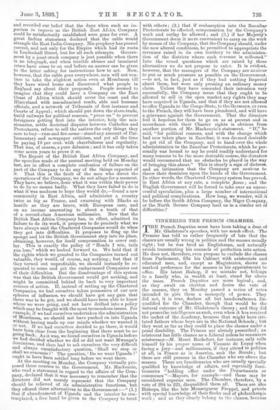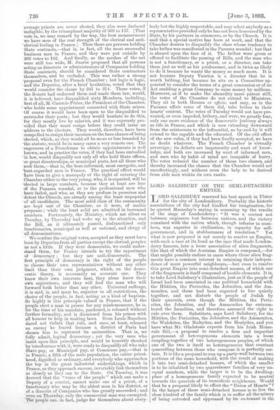TINKERING THE FRENCH CHAMBER. T HE French Deputies must have been
taking a dose of Mr. Gladstone'a speeches, with too much effect. The Premier has told us rather frequently of late that the classes are usually wrong in politics and the masses usually right ; but he was bred an Englishman, and naturally avoids transmuting his counsels of perfection into action. He does not, therefore, even propose to exclude the classes from Parliament, fills his Cabinet with aristocrats and educated men, and, except as Magistrates, shows no marked preference for the masses in his appointments to office. His latest Bishop, if we mistake not, belongs to a family who, in wealth at least, stand far above the mass. French Deputies are more logical.; and, as they await an election and desire the vote of the masses, they on Monday passed a series of votes intended to give them a monopoly of power. They did. not, it is true, declare all but handicraftsmen dis- qualified for the Chamber, though that would be the natural outcome of Mr. Gladstone 's theory ; and they (lid not proscribe intelligence as such, even when it has received the cachet of the Academy, because that might have irri- tated fathers whose boys are in the National Schools; but they went as far as they could to place the classes under a penal disability. The Princes are already proscribed; an aristocrat has little chance as a Liberal unless he renounces aristocracy—M. Henri Rochefort, for instance, only calls himself by his proper name of Vicomte de Lueay when facing a jury—and millionaires, if they attend to politics at all, in France as in America, seek the Senate ; but there are still persons in the Chamber who are above the masses. There are functionaries who are usually specially qualified by knowledge of affairs, and especially func- tionaries "holding office under the Departments or communes "—Mayors, for example—and these may be considered superior men. The Chamber, therefore, by a vote of 294 to 221, disqualified them all. There are also Bishops, like the late Monseigneur Freppel, and priests with special knowledge of their flocks and of philanthropic work ; and as they clearly belong to the classes, because average priests are never elected, they also were declared ineligible, by the triumphant majority of 369 to 137. [That vote is, we may remark by the way, the best measurement we have seen of the real strength of the clerical and anti- 'clerical feeling in France.] Then there are persons holding State contracts,—that is, in fact, all the most successful business men in France, and they were put outside by 268 votes to 182. And finally, as the meshes of the net were still too wide, M. Juares proposed that all persons acting as directors or administrators of Companies holding State contracts, should be considered State contractors 'themselves, and be excluded. This was rather a strong 'proposal even for the French Chamber ; but logic is logic, • and the Deputies, after a brief hesitation, voted that they 'would consider the clause by 241 to 214. These votes, if the Senate had endorsed them and made them law, would, it is believed, have disqualified sixty Members, including, first of all, M. Casimir-Prier, the President of the Chamber, who holds some appointment connected with State mines. Of course it would have been open to the disqualified to surrender their posts ; but they would hesitate to do this, • for they mostly live by salaries, and it was expressly pro- vided that they must resign before they could issue an • address to the electors. They would, therefore, have been compelled to resign their incomes on the bare chance of being elected, which, as they would all be more or less branded by the statute, would be in many cases a very remote one. The - eagerness of a Frenchman to obtain appointments is well known, and in practice the votes, if they had been embodied in law, would disqualify not only all who hold State offices, or great directorships, or municipal posts, but all those who seek them,—that is, the best-informed, most energetic, and "best-regarded men in France. The practical effect would have been to give a monopoly of the right of entering the Chamber either to the very young, who, it is expected, will be 'elected in large numbers, because they at least are free of the Panama scandal, or to the professional men who have failed, and-who, as they are profuse in promises and • detest the Church, are already among the least unpopular of all candidates. The most solid class of the community are kept out of the Chamber, as it were, of malice • peepense ;' while the least solid are admitted in increased numbers. Fortunately, the Ministry, which sat silent on Tuesday, by Thursday had woke up to the situation, and the Bill,, as it ultimately passed, disfranchised only functionaries, municipal as well as national, and clergy of all denominations.
' We confess the original votes, accepted as they must have been by Deputies from all parties except the clerical, perplex us not a little. If they were democratic, we could under- stand them, for France intends to try the experiment of democracy ; but they are anti-democratic. The first principle of democracy is the right of the people to choose their own representatives without any other • limit than their own judgment, which, on the demo- cratic theory, is necessarily an accurate one. They know their own interests best, they alone know their own aspirations, and they will find the man who will forward both better than any other. Universal suffrage, it is said, is, and must be, superior to all restrictions, the choice of the people, in fact, acting as a kind of baptism. So highly is this principle valued in France, that if the people elect a man in prison for any misdemeanour, he is, for the time of his mandate, pardoned, is released without further formality, and is dismissed from his prison with all honour to help in making laws. Even Louis Napoleon dared not violate that rule, and once, at least, released an enemy he feared because a district of Paris had chosen him to represent its animosities. That is, we fully admit, logical democracy ; yet the very men who • insist upon this principle, and would be honestly shocked by interference with it, were ready to disqualify all who take State pay, or Municipal pay, or Commune pay,—that is in France, a fifth of the male population, the entire priest- hood, dignified or ordinary, and everybody who approaches the top in the great industrial undertakings, which in France, as they approach success, invariably link themselves • as closely as they can to the State. On Tuesday, it was decreed that the "voice of the people" which can make a Deputy of a convict, cannot make one of a priest, of a functionary who may be the ablest man in his district, or of a director of Companies who has greatly succeeded ; and even ,on Thursday, only the commercial man was exempted. The people can, in fact, judge for themselves about every- body but the highly respectable, and may select anybody as a representative provided only he has not been honoured by the State, by his partners in commerce, or by the Church. It is said that a special motive has been at work, and that the Chamber desires to disqualify the class whose tendency to take bribes was manifested in the Panama scandal ; but that is absurd upon the face of it. The bribes were given or offered to facilitate the passing of Bills, and the man who is not a functionary, or a, priest, or a director, can take them just as well as his predecessor, and is twice as likely to do it because he wants the money so much more. It is not because Deputy Vaurien is a director that he is worth bribing, but because he sits on a Committee ap- pointed to consider the terms of a great concession or of an Act enabling a great Company to raise money by millions. Moreover, as if to make the absurdity more patent still, the votes of the Chamber do not extend to Ministers. They sit in both Houses ex officio, and may, as in the Panama affair some of them did, take bribes to their hearts' content. The votes of Tuesday would not have pre- vented, or even impeded, bribery, and were, we greatly fear, only one more evidence of the democratic jealousy always so rife in France, and which is now extending downward. from the aristocrats to the influential, as by-and-by it will extend to the capable and the educated. Of the evil effect of the new rules, if they had been finally accepted, we have no doubt whatever. The French Chamber is virtually sovereign ; its defects are impetuosity and want of know- ledge, and both are increased by want of informed men, and men who by habit of mind are incapable of hurry. The votes reduced the number of those two classes, and thereby increased the chance that the Chamber would act unreflectingly, and without even the help to be derived from able men within its own ranks.







































 Previous page
Previous page